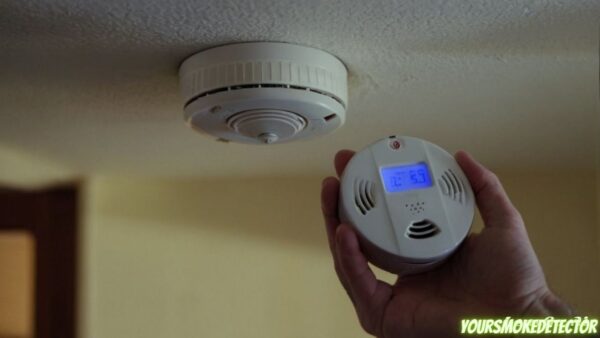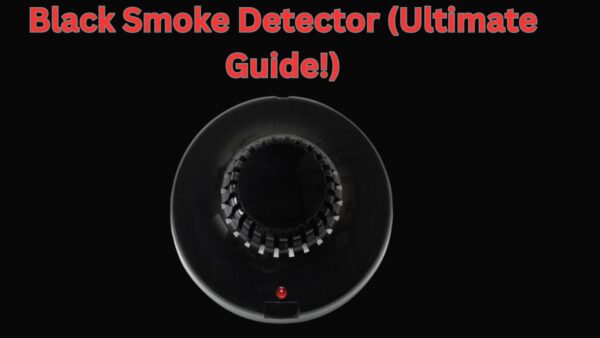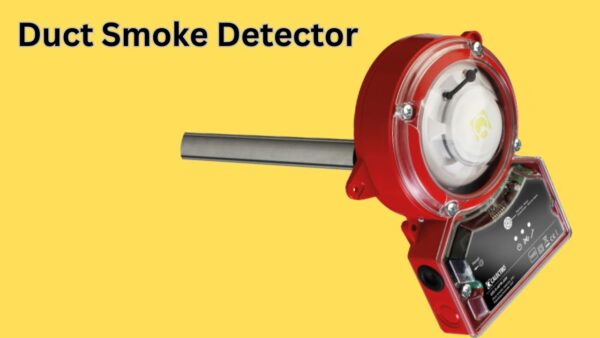Smoke detectors are indispensable home safety devices designed to alert occupants to the presence of smoke and potential fire.
However, there are instances where a smoke detector can become too sensitive, triggering false alarms due to minor factors like steam, dust, or even burnt toast.

This heightened sensitivity, while demonstrating the efficiency of the device, can lead to unnecessary panic and annoyance.
In this article, we will explore the reasons behind overly sensitive smoke detectors and provide practical fixes to address this issue.
Smoke Detector Too Sensitive

1 . False Alarms Triggered by Dust
Cause
Dust particles can infiltrate your smoke detector, interrupting its normal functioning and leading to false alarms.
These particles block the path of the light beam inside the smoke detector, causing the unit to go off without any immediate fire threat.
This is a common issue, particularly in areas with high dust or pollution levels, and during home renovations when the air is filled with dust and debris.
Solution
Regular cleaning and maintenance are key to preventing false alarms due to dust.
Use a vacuum cleaner with a brush attachment to gently clean the exterior vents of the smoke detector.
Do not open the unit as this could damage the internal components. If the false alarms persist, consider hiring a professional or, ultimately, replacing the smoke detector.
Always remember, ensuring your smoke detector is working properly is crucial for your safety.
2 . Interference from Steam or High Humidity
Cause
High humidity or steam can confuse your smoke detector, leading to unwarranted alarms.
Smoke detectors work by sensing particles in the air, and steam from a hot shower or boiling water can produce enough particles to trip the sensor.
Areas of high humidity also confuse smoke detectors as the water vapor in the air can mirror the presence of smoke.
This problem is particularly prevalent in bathrooms, kitchens, and humid climates.
Solution
Avoid installing smoke detectors too close to bathrooms or kitchens to prevent false alarms triggered by steam or high humidity.
Use exhaust fans and ventilation systems to disperse steam quickly in these areas.
Consider using heat detectors in these locations instead, as they are activated by temperature rather than particles in the air.
If the problem persists, opt for a smoke detector with a ‘hush’ feature which allows you to temporarily desensitize the unit.
Remember, correct placement and suitable choice of detector are key to averting false alarms due to steam or high humidity.
3 . Sensitivity to Insects and Small Particles
Cause
Insects and other small particles can easily get into the smoke detector casing and obstruct the sensor, triggering a false alarm.
Insects are attracted to the warmth and light of the detectors, especially in cooler weather and at nighttime.
Smaller particles like heavy smoke from cooking or even tiny fibers from textiles can similarly interfere with the detector’s operation.
This issue is more pronounced in areas prone to insects and in homes with open-fire cooking or wood-burning stoves.
Solution
Regularly check and clean your smoke detectors to prevent false triggers caused by insects and smaller particles.
Consider using insect-repellent sprays or ultrasonic pest repellers around the smoke detector to deter bugs.
For small particles, position your smoke detectors away from areas producing excessive smoke or dust.
Always ensure your detectors are housed in a protective casing that allows for air flow, but limits the entry of small particles.
If these issues persist, consider opting for a smoke detector with advanced photoelectric technology, which is less prone to false alarms.
4 . Excessive Use of Aerosols near the Detector
Cause
Using aerosols such as air fresheners, cleaning sprays, or deodorants near smoke detectors can often lead to false alarms.
The tiny particles released by aerosols can enter the detector and mimic the presence of smoke, triggering an unwarranted alarm.
Aerosols scatter light in a similar manner to smoke, and the detector fails to distinguish between the two, viewing the aerosols as a potential fire hazard.
This issue is prevalent in homes or areas where aerosols are used frequently and near smoke detectors.
Solution
To prevent false alarms due to aerosols, be mindful of the location where aerosols are being used. Avoid spraying aerosols directly under or near the smoke detectors.
Regularly clean and maintain the detectors to remove any aerosol particles that might have infiltrated.
If these measures don’t help, consider relocating the detector to an area less exposed to aerosols or use a smoke detector with a ‘silence’ feature that allows you to temporarily silence the alarm in case of false triggers.
Remember, the correct use of aerosols and the proper placement of smoke detectors can significantly reduce false alarms.
5 . Cooking Smoke Sensitivity
Cause
Smoke from cooking can often trigger false alarms in sensitive smoke detectors.
The particles and vapors emitted during cooking, especially when frying or grilling, can be mistaken by the detector for smoke from a fire, causing the alarm to sound.
This issue is particularly common in homes with open kitchens or detectors positioned close to cooking areas.
Open flames, high heat, and smoky cooking methods can all contribute to this problem.
Solution
To prevent false alarms triggered by cooking smoke, position smoke detectors away from the kitchen or areas where you often engage in high-heat cooking.
Ensure your kitchen is well-ventilated to quickly disperse smoke and heat. A range hood or fan can be particularly effective for this.
Consider using a ‘hush’ button-equipped detector near your cooking area, which can temporarily silence the alarm.
If your smoke detector is excessively sensitive despite these precautions, consider replacing it with a heat detector or a photoelectric smoke detector, which is less sensitive to cooking smoke.
6 . Improper Detector Installation
Cause
Smoke detectors that have been improperly installed can often cause numerous false alarms.
The incorrect placement, such as near air vents or windows, may result in the detector being overly sensitive to regular air flow or ambient particles.
The positioning of the detector is crucial as the location can significantly affect the sensor’s ability to accurately detect smoke.
Furthermore, if the detector is not securely fixed, it could become unstable and falsely trigger the alarm.
This issue is particularly common in DIY installations where proper guidelines have not been followed.
Solution
Ensure your smoke detectors are installed by a professional or follow the manufacturer’s installation guide thoroughly if you choose to do it yourself.
Avoid installing detectors near windows, doors, or air vents where the drafts could interfere with their operation.
The detectors should be securely mounted on the ceiling or high on a wall, and at least 10 feet away from cooking appliances to reduce false alarms.
Regular maintenance and checks will also help ensure your smoke detectors are functioning correctly.
If you still experience frequent false alarms, it might be time to consider replacing the unit with a more advanced one.
7 . Proximity to Air Conditioning or Heating Vents
Cause
Air conditioning and heating vents can disrupt the normal function of smoke detectors, leading to false alarms.
Warm air currents from heating vents or cold drafts from air conditioning can confuse the sensors in the detector, causing it to mistakenly identify these as signs of a fire.
The issue is particularly prevalent in homes or buildings where smoke detectors are installed in close proximity to heating or air conditioning vents.
Solution
To eliminate this problem, avoid installing smoke detectors near air conditioning or heating vents. Instead, choose locations that are free from direct airflow from these vents.
Regular maintenance and cleaning of the vents can also help reduce dust and other particles that might disrupt the detectors.
If the problem persists, consider relocating your smoke detectors or investing in models resistant to air current interference.
8 . Detector Age and Wear
Cause
As with any electronic device, smoke detectors are subject to wear and tear over time.
The age of the detector plays a critical role in its efficiency and reliability, with older units often more prone to false alarms.
The sensors within the detector can become less responsive over time, and accumulated dust and grime can compromise their accuracy.
Furthermore, outdated technology in older models may not be able to distinguish as effectively between different types of smoke or air particles, leading to unnecessary alarms.
Solution
Regular maintenance and cleaning can prolong the lifespan of your smoke detector, but it is recommended to replace your units every 10 years as a standard safety measure.
Always ensure to check the manufacture date on your detectors, not just the installation date, as the unit may have been in storage for a while before being installed.
For older models, consider upgrading to a detector with advanced sensor technology to improve accuracy and minimize false alarms.
Remember, a timely replacement of smoke detectors can ensure optimal performance and increase the safety of your home or office.
9 . Interference from Electrical Devices
Cause
Smoke detectors can sometimes be affected by interference from electrical devices, such as microwaves, computers, or other appliances emitting electromagnetic radiation.
These emissions can confuse the detector’s sensors, triggering false alarms.
Highly crowded electrical outlets or improperly grounded electrical systems can exacerbate this issue, as they may produce electrical noise that disturbs the detector.
Solution
To mitigate false alarms due to electrical interference, keep smoke detectors at a safe distance from electrical appliances.
Avoid installing them near crowded electrical outlets or devices known to emit electromagnetic radiation. Proper grounding of electrical systems can also help reduce interference.
If the issue persists despite these measures, consider using smoke detectors designed to resist electrical interference, or consult with a professional electrician to examine your home’s electrical system.
10 . Battery-Related Issues
Cause
Battery-related issues are a common cause of false alarms in smoke detectors.
The detector’s performance can be hindered by weak or expired batteries, causing it to signal a false alarm.
Sometimes, incorrect battery installation or usage of non-recommended battery types can also lead to problems.
Batteries might also corrode over time, affecting the electrical connections within the detector and causing erratic behavior.
Solution
To avoid battery-related issues, ensure you replace the batteries of your smoke detector annually, even if they appear to be functioning properly.
Always use the battery type recommended by the detector’s manufacturer.
Check for any signs of corrosion on the battery terminals, and clean them or replace the battery if necessary.
Regular battery checks and maintenance can help keep your smoke detectors functional and reliable, reducing the chances of false alarms.
11 . Sensitivity to Chemical Fumes
Cause
Smoke detectors can be overly sensitive to various chemical fumes, leading to frequent false alarms.
Common household products, like cleaning solutions, paint, or even hairspray, can emit aerosols that the detector may interpret as smoke.
This issue becomes notably significant in spaces where such products are regularly used or where ventilation is inadequate.
Solution
To address this issue, ensure good ventilation in areas where chemical products are frequently used.
By allowing fresh air to circulate, the likelihood of false alarms can be substantially reduced.
Consider relocating your smoke detectors away from places where these products are commonly used, like bathrooms or kitchens.
If false alarms persist, you might want to consider investing in smoke detectors that are less sensitive to common aerosols.
Remember, understanding your detector’s specifications and installing it in a suitable location can greatly enhance its efficiency and reduce false alarms.
12 . Inappropriate Detector Type for the Area
Cause
When the type of smoke detector installed isn’t suitable for the area, it can lead to a higher incidence of false alarms.
Different smoke detectors employ different types of sensor technology, some being more sensitive to certain types of smoke particles than others.
For example, ionization detectors are highly sensitive to flaming fires, while photoelectric detectors are better at detecting smoky, smoldering fires.
If the wrong type of detector is used, it may respond inadequately or overreact, leading to false alarms or delayed responses.
Solution
Choosing the appropriate detector for the area can significantly reduce the incidence of false alarms.
It’s crucial to understand the different types of smoke detectors and their strengths and weaknesses.
Install ionization detectors in areas susceptible to fast, flaming fires, such as kitchens.
Conversely, use photoelectric detectors in places where smoky, smoldering fires are more likely, such as lounges or bedrooms laden with furnishings.
A combination of both types of detectors across different areas of a home or building can ensure comprehensive fire detection.
Always seek professional advice when unsure about the best smoke detector for a specific area.
13 . Faulty Detector Circuitry
Cause
Faulty detector circuitry is another common reason for false alarms in smoke detectors.
The internal components of a smoke detector, including its sensor and alarm circuits, can fail over time due to age, excessive dust accumulation, or manufacturing defects.
This can result in the smoke detector sounding off without any apparent reason, causing unnecessary panic.
Solution
The solution to this issue involves regularly testing your smoke detectors to ensure they are functioning properly.
If a smoke detector frequently sounds off without cause and the common fixes do not resolve the issue, it might be an issue with the internal circuitry.
In these instances, it’s best to replace the entire unit.
Make sure to have the replacement done by a professional to ensure correct installation and functioning.
It’s also advisable to choose detectors from reputable manufacturers who offer warranties for their products to safeguard against potential manufacturing defects.
14 . Intermittent Wi-Fi Connectivity (for Smart Detectors)
Cause
Smart smoke detectors rely on Wi-Fi connectivity to send alerts and function seamlessly.
When the Wi-Fi connection is unstable or intermittent, it can hinder the smoke detector’s ability to function effectively, often leading to false alarms or failure to send alerts.
Factors that can cause such intermittent connectivity include distance from the router, obstacles interfering with the Wi-Fi signal, and network congestion.
Solution
To ensure a stable Wi-Fi connection for your smart smoke detectors, place your router in a central location within your home to maximize coverage.
You may also want to consider using Wi-Fi extenders or mesh networks to boost signal strength in areas further from the router.
If network congestion is an issue, dedicate a specific band of your dual-band router for your smart devices.
Regularly updating your router’s firmware and resetting your network can also aid in maintaining a stable connection.
For persistent connectivity issues, it might be worthwhile to contact a tech professional or your internet service provider for assistance.
15 . Lack of Regular Maintenance or Cleaning.
Cause
The performance of a smoke detector can deteriorate over time due to the lack of regular maintenance or cleaning.
Dust, dirt, or other small particles can accumulate within the sensor chamber, interfering with its ability to detect smoke accurately.
This can lead to an increased incidence of false alarms or even a total failure of the detector, compromising the safety of inhabitants.
Solution
Implementing a routine maintenance schedule can help ensure the longevity and accuracy of your smoke detectors.
Set a regular date for cleaning each of your detectors, making sure to gently vacuum or dust the exterior vents to prevent particle buildup.
Additionally, test your smoke detectors monthly to ensure they are functioning properly and replace batteries annually or as needed.
Remember, a clean and well-maintained smoke detector is a reliable safety tool.
If you are unsure about how to properly maintain your smoke detectors, consult the device’s user manual or contact the manufacturer’s customer support for further assistance.
Conclusion
In conclusion, maintaining the efficacy of your smoke detectors is a vital aspect of home safety.
False alarms can be minimized and sometimes avoided altogether by understanding their causes and implementing the appropriate solutions.
From selecting the correct type of detector for each specific area, and ensuring stable Wi-Fi for smart detectors, to executing regular maintenance and cleaning, each step plays a crucial role in ensuring your smoke detectors function as they should.
Remember, while these measures can significantly reduce the incidence of false alarms, they should never replace the urgency of an alarm.
Always treat every alarm as a potential threat and evacuate the premises immediately to ensure safety.
FAQs
Can you adjust the sensitivity of a smoke detector?
Yes, certain smoke detectors allow sensitivity adjustments. However, it’s not recommended to alter these settings without professional advice, as this might compromise its effectiveness.
Why is my smoke detector very sensitive?
Smoke detectors can be overly sensitive due to factors like dust accumulation or placement close to cooking appliances, which can trigger false alarms.
Which smoke detector is less sensitive?
An ionization smoke detector is generally less sensitive to slow, smoky fires, and more sensitive to fast, flaming fires. It’s best to use these in areas where fast, flaming fires can occur.
Hard Wired Smoke Detector Red Light Flashing
Chirping Noise in House Not Smoke Detector
Fire Alarm Randomly Going Off for a Few Seconds
Kidde Smoke Alarm Flashing Red No Sound
Carbon Monoxide Detector Green Light Stays On
Blinking Red Light on Smoke Detector
First Alert Smoke Detector Green Light Blinking
Smoke Detector Blinking Red No Sound
Mains Smoke Alarm Beeping Every 30 Seconds
Why Did My Fire Alarm Randomly Go Off in the Middle of the Night
How Long Will a Smoke Detector Chirping After Changing Battery
Smoke Detector Flashing Red Every 30 Seconds



